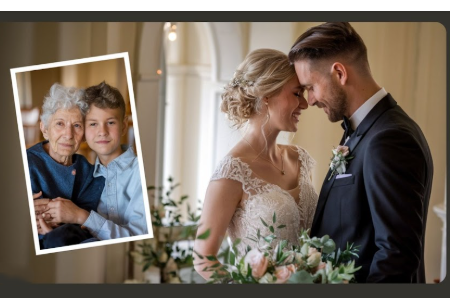Grief is rarely simple to navigate. A daughter’s wedding date turned into a flashpoint for one family’s unresolved pain and raw emotions. A particularly painful question has been raised by the decision to have a happy event on a date that has already been marked by tragedy: was the daughter wrong to pick that day, or is the mother at fault for being open about the consequences?
A close-knit family was devastated by a terrible accident about two years ago. A terrible car accident claimed the lives of a mother, a brother, and a nephew. The brother and his young son died soon after the grandmother’s sudden death. The family dynamic was profoundly changed by that loss, and their absence still looms large, particularly for those left behind, such as the father and the brother’s widow.
| Detail | Information |
|---|---|
| Topic | Family Conflict Over Wedding Date |
| Main Individuals Involved | Mother (narrator), Daughter (Betty, 25F), Fiancé |
| Family Background | Small family, lost mother, brother, and nephew |
| Date Conflict | Wedding date aligns with death anniversary |
| Main Concern | Emotional toll on family, lack of attendance |
| Daughter’s Stance | Sentimental value tied to date, venue availability |
| Mother’s Response | Supportive but honest about consequences |
| Family Response | Sister-in-law, nephew, and father declined invite |
| Community Reaction | Mixed feelings on loyalty, empathy, and obligation |
| Original Source | Reddit AITA Post |
The daughter, Betty, became engaged and started getting ready for the wedding with her fiancé. They decided on a date that coincided with the seventh anniversary of their meeting and picked a location. However, that day’s significance went beyond romance. Additionally, it was the precise anniversary of the deadly collision. There was no denying the emotional collision between the joy of the future and the loss of the past.
At first, the mother handled the matter cautiously because she was torn between her daughter’s joy and her family’s sorrow. She suggested that her daughter think about changing the date. She delicately and calmly described how upsetting that day was for the other family members. But Betty refused to back down. She mentioned personal symbolism and the availability of the venue. Perhaps grudgingly, the mother accepted the ruling.
The repercussions became evident as the invitations were mailed. In silence, Betty’s grandfather, aunt, and cousin said no. Their absence was motivated by emotional self-preservation rather than disobedience. There is no set timetable for grieving. On anniversaries, it reappears, unexpectedly and vividly.
Distressed by the lack of RSVPs, Betty called her mother, who responded with truthful compassion. “Love, I’m having a hard time on this date too,” she said. However, I will attend your wedding. But you have to realize that this date decision had repercussions, and you must face them.
Betty felt betrayed by that moment, which was meant to be honest and supportive. She thought her mother was saying, “I told you so,” in response. Their communication stopped as her emotional barriers rose.
After providing his wife with silent support, the father later suggested that she might have been better off keeping quiet. However, it’s not always a sign of strength to remain silent when dealing with complex grief. It can be avoidance at times.
The way that celebration and grief have become intertwined is especially noteworthy in this instance. Furthermore, this is not specific to this family. Families face the conundrum of dates, which is tinged with conflicting emotions, across generations and cultures. Public figures frequently conflate memory and intention, as seen in the cases of Prince Harry selecting significant royal locations despite previous controversies and celebrities like Celine Dion, who has paid tributes on her late husband’s birthday. However, they are scrutinized for those decisions just like everyone else.
In this instance, the mother’s function is similar to that of a bridge in that she strains to support both shores. She is standing with one foot in respect for family trauma and the other in devotion to her daughter’s dreams. In addition to being relatable, that tension does a remarkable job of bringing to light the subtle complexities of contemporary family dynamics.
Despite being emotionally charged, Betty’s response also represents a generation that was brought up to give special occasions a unique meaning. She has a very human attachment to the day she met her fiancé for the first time. That date represents the enduring power of love for her. Others, however, view it as a day shrouded in mourning and absence.
Whether on purpose or not, she created an emotional barrier that others were unable to cross by using that date. Even though the fallout is painful, it becomes a striking example of how dates are more than just numbers. They convey tales, some joyous, some oppressive.
The concept of obligation adds even more complexity to this. Is the sole purpose of going to a wedding to show support for the bride and groom? Or does it have to do with emotional preparedness? Is it reasonable to expect someone who would prefer to grieve in private to dance at a party?
These queries have come up on various social media sites, particularly Reddit’s AITA forum, where heated discussions are common. While some commenters maintain that the daughter exhibited emotional immaturity, others contend that the family ought to accept her decision. However, the truth—which is especially complex in this tale—lies somewhere in the middle.
The mother’s choice to communicate the significance of the date while still reaffirming her intention to go comes across as emotionally astute and remarkably obvious. She eschewed appeasement in favor of honesty. It comes from a desire to affirm each person’s emotional reality, not from malice or resentment.
That method is becoming less and less common in family dynamics, where feelings are frequently suppressed or ignored in favor of custom. Instead, the mother allowed others to make their own decisions guilt-free by admitting discomfort and accepting the consequences.
This story also illustrates how cultural norms are changing regarding wedding planning and family interactions. A discernible trend toward personalization has emerged in recent years, with distinctive dates, destination locations, and Instagrammable moments. However, despite its immense versatility and emotional depth, personalization is not a standalone concept. Family history creeps in, sometimes subtly and other times overpoweringly.
Conflicts like these can be turned into opportunities with strategic insight and caring communication. For growth, not just for resolution. The mother demonstrated a strategy that is especially advantageous for emotionally mature relationships by setting clear expectations, accepting disappointment, and still making the decision to show up.

